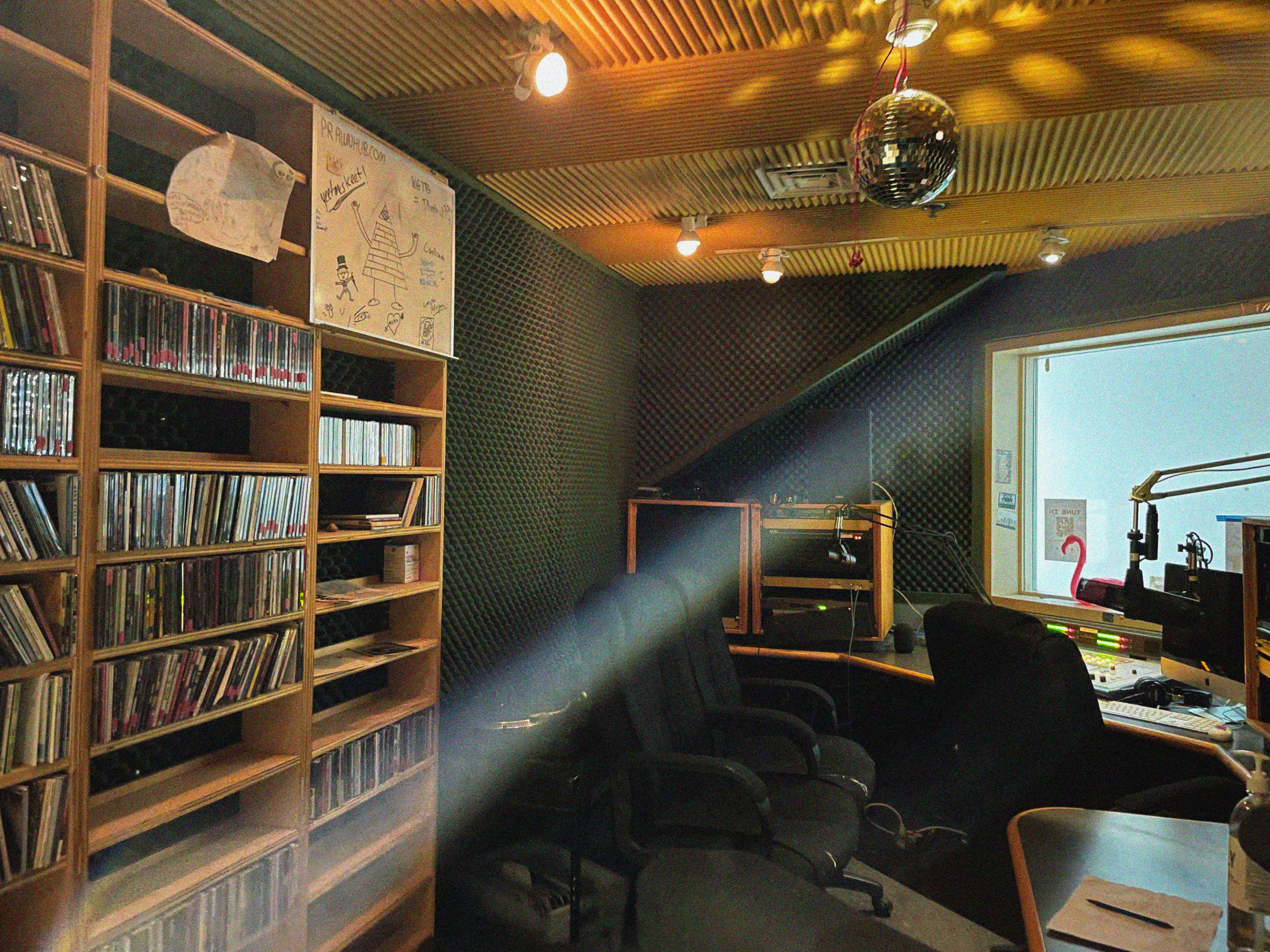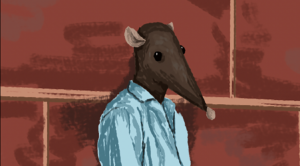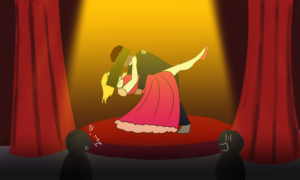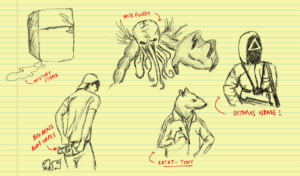“That’s the thing about 100 gecs, it weeds out the normies,” Sara Amar (COL ’24), said of the glitchy, maximalist hyperpop duo, waving her hands around the microphone in the WGTB studio to emphasize the point.
Connor Lammas, co-host of Amar’s Friday night student radio show “Spilling Tea and Music History,” jumped in to agree. “If it doesn’t make my brain go brrr, I don’t want it.”
“If I ever hear Mitt Romney go, ‘Damn, I was bumping 100 gecs last night,’ I’ll jump off a cliff,” he added.
After 16 consecutive hours and counting with WGTB, Georgetown’s student-run radio station, this was the kind of musical commentary we were accustomed to. As the high-octane “stupid horse” took off, neon lights blinking on the control panel, the pair turned to each other, bantering with an easy rapport that we had come to recognize as routine among co-hosts since arriving at WGTB’s Leavey Center studio at 7:30 a.m. that day.
In an effort to document the entirety of WGTB’s Friday setlist—which ranged from shows focused purely on music to topical conversation hours—we hunkered down in the studio’s adjoining, poster-plastered lounge some DJs call “the womb.” Founded in 1946, the station has moved from 90.1 FM to an exclusively online broadcast and has undergone several transformations in both style and form over the last 75 years.
Today, student DJs have complete control over their weekly 90-minute slot (two exceptions: no dead air and no swearing). Listeners who tune in between 7:30 a.m. and 3:00 a.m. by visiting the WGTB website or scanning the QR code posted on the studio window can hear everything from a recording of the Kill Bill whistle to debates over whether FIJI Water is bottled at the source, and the Voice sat down determined to hear it all.
For Anya Gizis (COL ’23), one of WGTB’s general managers, the station’s ridiculousness is part of its appeal. When asked for a rundown of the radio’s lore and an explanation of the “womb” nickname, her eyes lit up. “Where ideas are born,” she explained. “You’re sitting and waiting for your show, waiting to go out.”
Allegedly, the lounge contains a copy of Maggie Rogers’ first single—which she mailed to the station for airplay and review—and a rare Wu-Tang Clan record “that we could sell for, like, 400 dollars.” The walls are covered with years of flyers and graffiti, signatures of DJs past, and invitations to open mic nights and air band competitions.
Besides serving as an unofficial archive for the station and the art it celebrates, the WGTB studio also offers students like Aman Bains (MSB ’22) a dedicated place to share music, both with and for friends. Since launching it freshman year, his show “Music Map” has evolved from a deep dive into a particular region and genre to an excuse to catch up with friends.
“I would choose a genre and choose a region, and the playlist would be based on that. So I would choose, like, Cali hip-hop,” Bains said. “Now, since I’m a senior and I have one semester left, the goal is just to have my friends come, and based on whatever friend comes, I curate a playlist for them.”
Unlike some hosts, Bains rarely talks on air, and as the session veered from Fateh and Diddy to the authors’ own indie rock favorites of Japanese Breakfast and MGMT, we wondered whether he had any particular audience in mind for the set.
“It is 100 percent for me,” he said. “To have this whole place to just listen to music? My own space? It’s pretty cool.”
Gizis echoed Bains’ appreciation for the creative freedom the studio space seems to encourage. “That’s the fun part of radio: You get to have this cool, weird platform even if no one’s listening.”
Even though every rustle and snort from our side of the radio room was broadcast to an invisible audience, we never felt that we, or the hosts, were exposed. The ease with which DJs conversed, and their seeming lack of concern for whomever might be tuning in, makes it so that a casual WGTB listener might feel like an eavesdropper. The hosts don’t care about an audience of strangers; instead, most play for an audience of friends, if anyone at all.
Even for student artists like Malachi Quarles (COL ’23) and Jabari Butler (MSB ’22), two of the most popular acts at Georgetown open mic nights and battles of the bands, radio still reserves the intimacy of a jam session between friends.
Their show, “Dusty Skin,” airs from 10:30 p.m. to midnight on Fridays and runs the gamut from techno to early Atlanta hip-hop. Quarles said neither host arrives at the studio with a theme in mind, just an ear for grooving bass lines and a mutual appreciation for the other’s art.
“We don’t know if anybody listens to it, but it’s sick,” he said. “When we did the show last semester, we didn’t even tell nobody about it.”
Since Butler lives off-campus, the pair rarely cross paths during the week. Hosting a radio show together, Quarles explained, gives them a treasured opportunity to catch up, share inspiration, and workshop new ideas for their own music. “While we’re playing the songs, we’re talking to ourselves mostly. We’re like, ‘Oh, that bridge is cool. Let’s find another song that makes me feel that way or makes me feel these colors,’ and it just works from there.”
The encyclopedic music knowledge Amar and Lammas bring to their own late-night show (each week is meticulously documented in its own Spotify playlist) is part of what makes “Spilling Tea and Music History” a compelling listen. On the night we interviewed them, the two friends had compiled a list of their favorite samples, spinning the original song before walking listeners through how another artist had chopped, screwed, or otherwise repurposed it.
“Who better to play with tempo than the villain himself, MF DOOM?” Lammas asked, introducing a song that warps the eerie outro of The Beatles’ “Glass Onion” in a way that left the four of us speechless when it ended. The silence fizzed; it felt like they’d struck gold.
Most of the night was chock full of energy: Each of Friday’s shows felt contained in its own comic and cultural universe, full of obscure Gen Z internet lingo and inside jokes that could leave even the most TikTok-savvy listener reeling. Nowhere was the flavor of the zeitgeist more apparent to us than in “Outrageous Acts,” hosted by Anya Caraiani (SFS ’24) and Olivia D’Angelo (COL ’24) from 6:00 to 7:30 p.m.
A gossip and advice show with a self-professed feminist edge, “Outrageous Acts” follows in the footsteps of Barstool Sports spinoff “Call Her Daddy.” “In our Tinder bios we literally say, ‘We’ll talk about you on our podcast,’” D’Angelo laughed.
She and Caraiani trade hookup stories and thoughts on Slavoj Žižek essays in bitterly funny conversations they edit and publish on Spotify each week. According to Caraiani, the podcast strives for a kind of radical transparency that other women in college will find relatable.
“We want to be a sounding board for other girls here and make sure they know that other people are going through it too,” Caraiani said. “Even though everyone seems to be perfect here at all times, we’re all going through it in the same way.”
Unpacking the messiness of college life is also at the heart of Sofia Mahairas (COL ’24) and Sylvie Buckalew’s (COL ’24) afternoon show, “BRAINFOG.” Airing from 1:30 to 3:0o p.m., the program’s woozy name belies its hosts’ sharp sense of humor.
Buckalew turned to us during a Kendrick Lamar interlude at the top of the show and explained her and Mahairas’ motivation for joining WGTB. “We like to talk, we talk a lot of shit,” she said simply. “It doesn’t really matter if anyone’s listening. It’s an hour and a half where I can just chill and just relax and do something I enjoy with someone I enjoy.”
“This is the most sentimental you’ll ever hear us be about each other,” Buckalew chided.
Over the next 90 minutes, the conversation veered from shrimp to marriage to whether men should wear open-toed shoes in March (short answer, no). Buckalew and Mahairas flagged down classmates through the studio’s dim window and texted friends they knew were tuning in, soliciting hot takes and the latest in pop culture news.
For the hosts of “Exile on M. Street”—a play on The Rolling Stones’ studio album Exile on Main St. (1972)—audience involvement is crucial to the show that runs from 12:00 to 1:30 a.m. While Rush’s “Circumstances” played, Nick Vianna (COL ’25) looked through his Instagram story for the next question he’d ask his co-host James Dolan (COL ’25). Earlier in the day, Vianna had posted a poll asking whether one microwaves or thaws Smucker’s Uncrustables.
“I think you thaw,” Vianna said. “I think you thaw,” Dolan repeated.
The two roommates see their show as a chance to talk about rock music—and peanut butter and jelly—and whatever else they find deserving of the same loving attention they devote to Keith Richards. Their elevator pitch? “Friends having fun on the radio,” Dolan said. “It has a lot more to do with those that listen than the actual content. We exist basically to have fun for ourselves and for our friends to have fun because they all love coming on the radio show, they like listening, they like asking questions.”
On “Exile on M. Street,” Vianna and Dolan spin rock records that take them back to when they took AP Music Theory together in high school, and between songs and Uncrustables debate the musical peak of Jimi Hendrix. For the most part, the two stay true to playing classic rock and prog rock, but they will always take requests from friends (Taylor Swift has slipped in on occasion).
WGTB provides as much of an auditory playspace connecting hosts and their listeners as it does a platform for other types of content. The club slot on Fridays from 3:00 to 4:30 p.m. allows student groups on campus to talk about their work, and this Friday, H*yas for Choice (HFC) talked about their upcoming programming between spins of Chaka Khan and SZA.
“We definitely feel like coming back from COVID and everything, we don’t have the same kind of presence with the student body that we used to have,” HFC Vice President Nina Yee (COL ’23) said. “Exploring other avenues to make our presence known, make our resources available, is huge for us.”
Between the conversations and songs, the radio room brought out new sides in the hosts and in us. Leaned back in leather swivel chairs with our feet kicked up on desks cluttered with old WGTB zines, we greeted each new DJ like an old friend. Playing unofficial host for 18 hours of airwaves, we learned a remarkable amount about the lives, passions, and fears of each DJ in the 90 minutes they kept the air alive.
And the later it got, the more intimate the space became. When the death of Foo Fighters’ drummer, Taylor Hawkins, broke, Vianna and Dolan, who both grew up adoring the band, processed the loss together on air. But they weren’t alone on their broadcast. Friends called in to talk about how much the drummer meant to them. “There’s nothing like falling in love with a band,” Dolan said. “He had more to give to the world. I expected that to happen and the fact that he didn’t is horrible. It’s heartbreaking.”
Even then they were able to find some laughs, getting through the rest of their set dedicated to the drummer, together.
The radio room supports those conversations as much as it does any other—that’s the beauty of it. Whether it’s Caraiai and D’Angelo’s discussion of plastic surgery or Amar and Lammas’ insight into bees, the radio gives these hosts unfettered access to the most free self-expression.
“I really like radio because it’s like, into the ether,” Amar said.
And into that ether, for 90 minutes a week, WGTB hosts share their favorite tracks in the entire world that disappear as soon as they are broadcast. The exchange of music between hosts—between friends—provides an excuse for people to bring something they love to others and express vulnerability in an environment that invites a weirdness and sincerity not often found at Georgetown.
And, with or without an audience, WGTB is a haven for students: the long-time best friends, the music geeks, the callers from home, and two very tired Voice reporters. After 18 hours surrounded by walls of beat-up cassette tapes and illuminated by the dim sparkle of a disco ball overhead, we couldn’t help but feel a little at home.






Appreciate the eclectic mix in Music Map. Added a few samples from there to my own playlist.